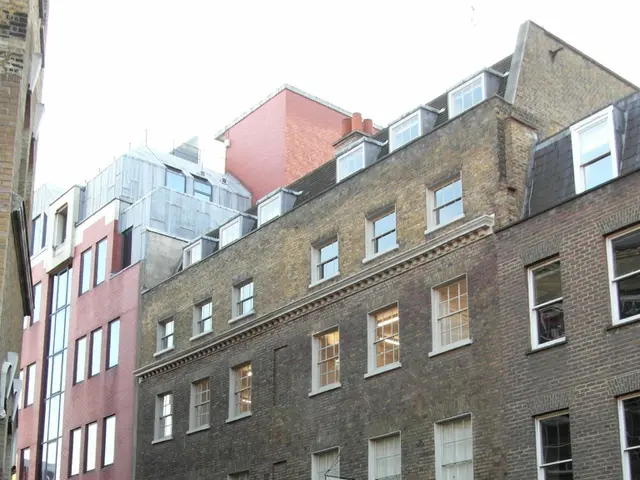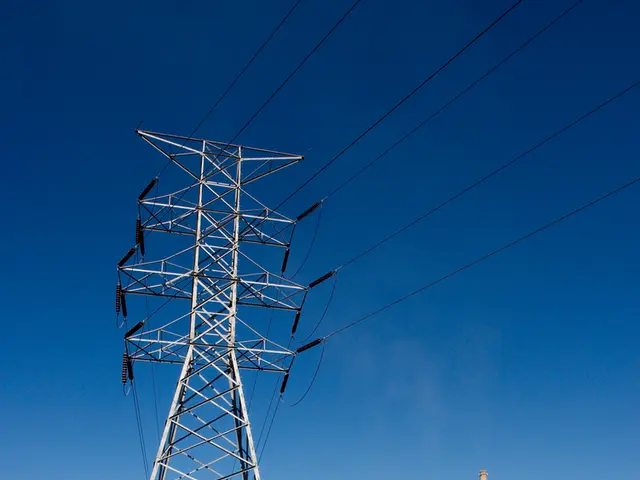Lending institutions in the FTSE 100 reap benefits from market chaos, yet provisions increase as well.
Britain's Top Banks Bask in First-Quarter Profits Amidst Geopolitical Chaos
The UK's banking titans, including HSBC, Barclays, Natwest, Standard Chartered, and Lloyds, have witnessed a boost in trading income during the first quarter, thanks to turbulent financial markets. However, the looming specter of tariff threats and geopolitical tensions has cast a shadow over their future earnings.
Leading the Pack - HSBC's Staggering Profit
HSBC set the tone for the reporting season, racking up a whopping $9.5bn (£7.1bn) pre-tax profit, a figure that surpassed analysts' projections by a significant margin.
Barclays and Natwest Beat Expectations
In hot pursuit, Barclays and Natwest posted profits of £2.7bn and £1.8bn respectively, both exceeding analysts' predictions.
Standard Chartered reported earnings of $2.1bn, an increase from $1.9bn in the same period last year. Despite a decrease in profits, Lloyds aligned with consensus predictions, recording £1.5bn. However, this figure represented a seven per cent drop year-on-year.
Markets Electrify Banking Operatives
President Donald Trump's erratic rhetoric on tariffs, potential recessions, and trade policy fuelled numerous stock sell-offs, with Barclays' investment bank cashing in on the chaos, bolstering its income by 16 per cent to £3.9bn.
HSBC's revenue from debt and equity markets jumped 47 per cent to $1bn, while wholesale transaction banking increased 14 per cent to $2.5bn.
These developments echoed the record equity revenues reported by Wall Street counterparts in the first quarter.
A Storm Brewing on the Horizon
While tariffs did not impact first-quarter profits, the evolving geopolitical landscape has cast a shadow over Banks' earnings outlook.
Lloyd's finance boss, William Chalmers, stated that corporate customers were adopting a "wait and see" attitude, but geopolitical tensions were "driving sentiment".
HSBC increased expected credit losses to $876m, up from $202m, while Barclays set aside £74m for elevated U.S. macroeconomic uncertainty. Natwest upped expected credit losses by £100m to £3.5bn, retaining post-model adjustments of £0.3bn related to economic uncertainty or 8.7 per cent of total impairment provisions.
Russ Mould, investment director at AJ Bell, pointed out that "Natwest has felt it prudent to increase provisions for bad debt - based not on what it is necessarily seeing in its loan book but due to the uncertainty created by US tariffs."
The Ring-Fencing Regime under Scrutiny
During results week, the opposition to the ring-fencing regime made headlines. Top executives from HSBC, Lloyds, Natwest, and Santander wrote to Rachel Reeves, lobbying for the Chancellor to scrap the policy.
The regulation requires major banks to separate their retail banking operations from their investment banking activities, introduced to ensure stability in the wake of the financial crisis.
Barclays' CS Venkatakrishnan was the exception, defending the regulation, noting, "You have to weigh against this the immense amount of depositor protection that the ring-fencing regime gives the country."
Holding Firm in the Face of Stamp Duty Changes
Despite three Bank of England interest rate cuts, net interest income remained steady across banks. The government's changes to Stamp Duty sparked a surge in mortgage lending, with Natwest's net loans increasing £3.4bn to £371.9bn.
EY's Dan Cooper stated, "Key drivers included rising contributions from banks' structural hedges, healthy deposit growth, and signs of improving loan demand."
With the Monetary Policy Committee anticipated to cut rates once more on May 8, banks' resilience in the face of economic uncertainty and ongoing geopolitical tensions has been evident.
HSBC and Standard Chartered's stock suffered significant losses in the aftermath of Trump's 'Liberation Day' levies. Both firms have substantial ties to Asian economies, hit hard by President Donald Trump's sizable tariffs. However, both firms remained confident, reiterating their full-year guidance and demonstrating their resilience amidst the President's tariff onslaught.
- HSBC's pre-tax profit of $9.5bn surpassed analysts' expectations, setting the tone for the reporting season among Britain's top banks.
- Barclays and Natwest also beat expectations, posting profits of £2.7bn and £1.8bn respectively.
- Standard Chartered reported earnings of $2.1bn, an increase from $1.9bn in the same period last year.
- Despite a decrease in profits, Lloyds aligned with consensus predictions, recording £1.5bn, but this figure represented a seven per cent drop year-on-year.
- Turbulent financial markets fuelled by President Donald Trump's erratic rhetoric on tariffs, potential recessions, and trade policy led to Barclays' investment bank cashing in on the chaos, bolstering its income by 16 per cent to £3.9bn.
- HSBC's revenue from debt and equity markets jumped 47 per cent to $1bn, while wholesale transaction banking increased 14 per cent to $2.5bn.
- Lloyd's finance boss, William Chalmers, stated that corporate customers were adopting a "wait and see" attitude, but geopolitical tensions were "driving sentiment".
- HSBC and Standard Chartered's stock suffered significant losses in the aftermath of Trump's 'Liberation Day' levies, but both firms remain confident, reiterating their full-year guidance and demonstrating their resilience amidst the President's tariff onslaught.








